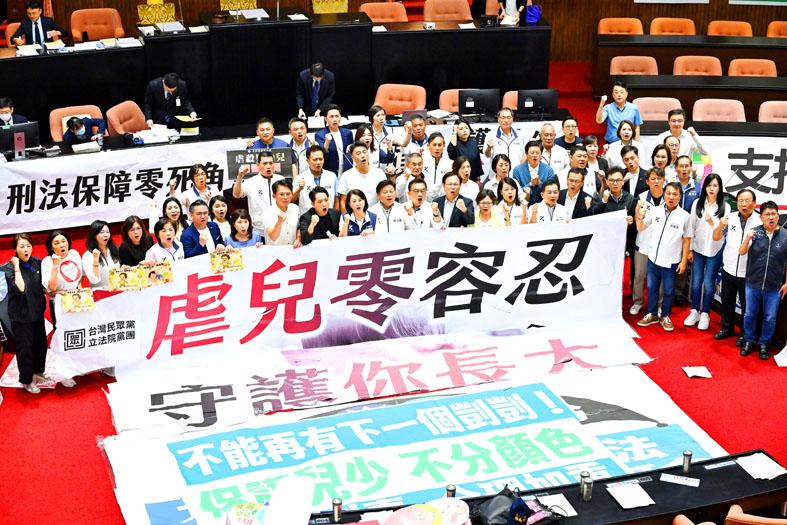The Legislative Yuan yesterday passed amendments to the Criminal Code allowing the death penalty in cases of child abuse resulting in the death of a child aged seven or younger.
The amendments also mandate a sentence increase by half for murder when the victim is seven or younger.
The changes follow public outrage over the 2023 death of a one-year-old boy, nicknamed Kai Kai (剴剴), who was allegedly tortured to death by his licensed at-home caregiver and her sister.

Photo: Chen Yi-kuan, Taipei Times
The proposed amendments to Article 272-1 of the Criminal Code were supported by the ruling Democratic Progressive Party (DPP), and the opposition Chinese Nationalist Party (KMT) and Taiwan People’s Party (TPP), although opinions differed on amendments to Article 286.
Article 271 of the Criminal Code, which allows for a death sentence, life imprisonment or a sentence of more than 10 years for murder, has been revised to include a clause that increases the sentence by 50 percent if the victim is younger than seven years old.
The death penalty or life imprisonment may also be imposed if the child is killed due to abuse.
The penalty for preparing to murder a child aged seven or younger has also been increased to a maximum of five years in prison.
Additionally, Article 286, which addresses the maltreatment of minors under the age of 18 or actions that impair their mental or physical health or development, specifies sentences ranging from six months to five years in prison for offenders.
According to the article, if the crime is committed with the intent to profit, the sentence can be extended to at least five years in prison, along with a fine of up to NT$3 million (US$102,020).
The amendments would increase the penalties by half if the victim is aged seven or younger.
In addition, abuse resulting in the death of a child aged seven or younger may now be punishable by death, life imprisonment or at least 10 years in prison, while abuse resulting in serious injury to a child under seven would now carry a sentence of at least 10 years in prison.
If the abuse is committed for profit or results in death, the offender may be sentenced to death, life imprisonment or at least 12 years in prison.
If the abuse leads to serious injury, the penalty would be life imprisonment or at least 12 years in prison.
For victims aged seven to 18, if abuse results in death, the offender would be sentenced to life imprisonment or handed at least a 10-year sentence, while if the offense is committed for profit and results in death, the offender would be punished by life imprisonment or at least 12 years in prison.
In cases resulting in serious injury, the sentence is set at a minimum of 10 years.

Taiwan is gearing up to celebrate the New Year at events across the country, headlined by the annual countdown and Taipei 101 fireworks display at midnight. Many of the events are to be livesteamed online. See below for lineups and links: Taipei Taipei’s New Year’s Party 2026 is to begin at 7pm and run until 1am, with the theme “Sailing to the Future.” South Korean girl group KARA is headlining the concert at Taipei City Hall Plaza, with additional performances by Amber An (安心亞), Nick Chou (周湯豪), hip-hop trio Nine One One (玖壹壹), Bii (畢書盡), girl group Genblue (幻藍小熊) and more. The festivities are to

Auckland rang in 2026 with a downtown fireworks display launched from New Zealand’s tallest structure, Sky Tower, making it the first major city to greet the new year at a celebration dampened by rain, while crowds in Taipei braved the elements to watch Taipei 101’s display. South Pacific countries are the first to bid farewell to 2025. Clocks struck midnight in Auckland, with a population of 1.7 million, 18 hours before the famous ball was to drop in New York’s Times Square. The five-minute display involved 3,500 fireworks launched from the 240m Sky Tower. Smaller community events were canceled across New Zealand’s

‘IRRESPONSIBLE’: Beijing’s constant disruption of the ‘status quo’ in the Taiwan Strait has damaged peace, stability and security in the Indo-Pacific region, MOFA said The Presidential Office yesterday condemned China’s launch of another military drill around Taiwan, saying such actions are a “unilateral provocation” that destabilizes regional peace and stability. China should immediately stop the irresponsible and provocative actions, Presidential Office spokeswoman Karen Kuo (郭雅慧) said, after the Chinese People’s Liberation Army (PLA) yesterday announced the start of a new round of joint exercises around Taiwan by the army, navy and air force, which it said were approaching “from different directions.” Code-named “Justice Mission 2025,” the exercises would be conducted in the Taiwan Strait and in areas north, southwest, southeast and east of Taiwan

‘SLICING METHOD’: In the event of a blockade, the China Coast Guard would intercept Taiwanese ships while its navy would seek to deter foreign intervention China’s military drills around Taiwan this week signaled potential strategies to cut the nation off from energy supplies and foreign military assistance, a US think tank report said. The Chinese People’s Liberation Army (PLA) conducted what it called “Justice Mission 2025” exercises from Monday to Tuesday in five maritime zones and airspace around Taiwan, calling them a warning to “Taiwanese independence” forces. In a report released on Wednesday, the Institute for the Study of War said the exercises effectively simulated blocking shipping routes to major port cities, including Kaohsiung, Keelung and Hualien. Taiwan would be highly vulnerable under such a blockade, because it